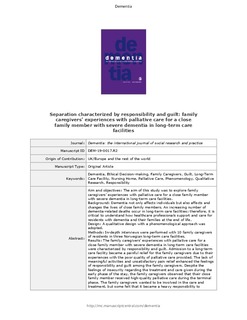Separation characterized by responsibility and guilt: Family caregivers' experience with palliative care for a close family member with severe dementia in long-term care facilities
Journal article, Peer reviewed
Accepted version

Åpne
Permanent lenke
http://hdl.handle.net/11250/2637567Utgivelsesdato
2020Metadata
Vis full innførselSamlinger
Originalversjon
10.1177/1471301219898341Sammendrag
Aim and objectives
The aim of this study was to explore family caregivers’ experiences with palliative care for a close family member with severe dementia in long-term care facilities.
Background
Dementia not only affects individuals but also affects and changes the lives of close family members. An increasing number of dementia-related deaths occur in long-term care facilities; therefore, it is critical to understand how healthcare professionals support and care for residents with dementia and their families at the end of life.
Design
A qualitative design with a phenomenological approach was adopted.
Methods
In-depth interviews were performed with 10 family caregivers of residents in 3 Norwegian long-term care facilities.
Results
The family caregivers’ experiences with palliative care for a close family member with severe dementia in long-term care facilities were characterized by responsibility and guilt. Admission to a long-term care facility became a painful relief for the family caregivers due to their experiences with the poor quality of palliative care provided. The lack of meaningful activities and unsatisfactory pain relief enhanced the feelings of responsibility and guilt among the family caregivers. Despite the feelings of insecurity regarding the treatment and care given during the early phase of the stay, the family caregivers observed that their close family member received high-quality palliative care during the terminal phase. The family caregivers wanted to be involved in the care and treatment, but some felt that it became a heavy responsibility to participate in ethical decision-making concerning life-prolonging treatment.
Conclusions
The family caregivers experienced ongoing responsibility for their close family members due to painful experiences with the poor quality of the palliative care provided. When their expectations regarding the quality of care were not met, the palliative care that was offered increased their feeling of guilt in an already high-pressure situation characterized by mistrust.